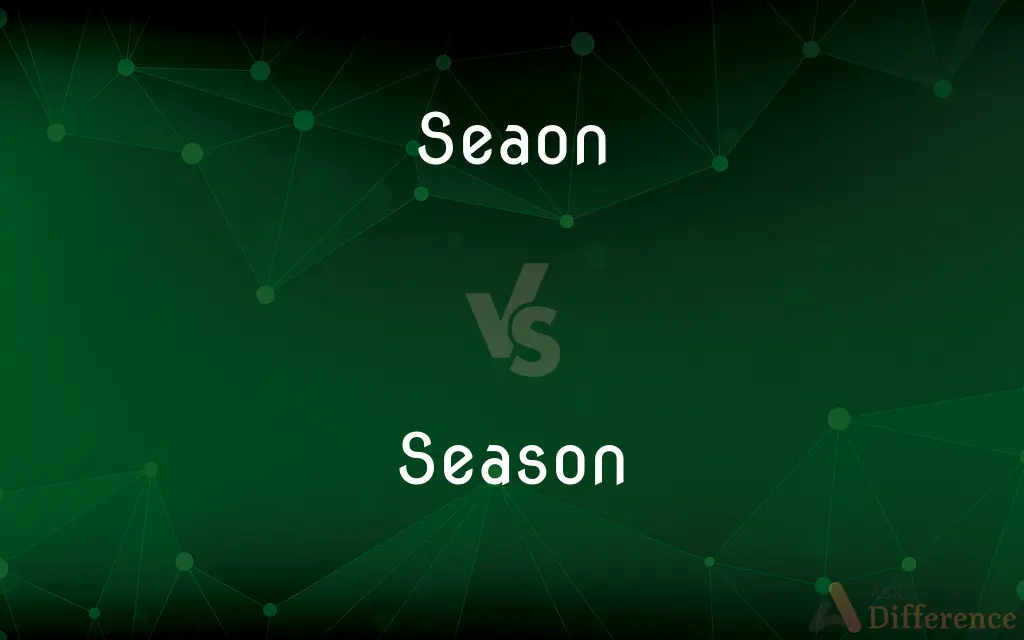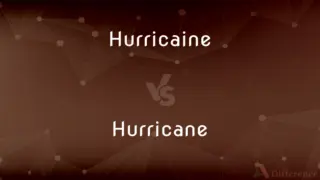Seaon vs. Season — Which is Correct Spelling?
By Tayyaba Rehman — Updated on March 31, 2024
"Seaon" is incorrect; the right spelling is "Season." Season refers to a time period characterized by specific weather conditions or activities.

Table of Contents
Which is correct: Seaon or Season
How to spell Season?

Seaon
Incorrect Spelling

Season
Correct Spelling
ADVERTISEMENT
Key Differences
Associate "season" with "reason," both end in "-son."
Think of the four seasons: spring, summer, autumn, and winter. All of them end with an "n."
Remember that "season" contains the word "sea," but needs the "s" at the end to make it complete.
Picture a seasoning container that says “Seasoning for all Seasons.”
Remember: "A year has sea-SONS, not sea-ONS."
ADVERTISEMENT
How Do You Spell Season Correctly?
Incorrect: The football seaon starts in September.
Correct: The football season starts in September.
Incorrect: They celebrate the rainy seaon with festivals.
Correct: They celebrate the rainy season with festivals.
Incorrect: It's my favorite seaon because of the holidays.
Correct: It's my favorite season because of the holidays.
Incorrect: We need to seaon the chicken before cooking.
Correct: We need to season the chicken before cooking.
Incorrect: The seaon changes bring beautiful colors.
Correct: The season changes bring beautiful colors.
Season Definitions
One of the four periods (spring, summer, autumn, and winter) into which the year is divided.
Winter is her favorite season.
A particular time or period of the year associated with a specific activity or event.
It's the holiday season again.
To enhance the flavor of food by adding spices, herbs, or salt.
She seasoned the soup with fresh herbs.
The right or suitable time for something.
Everything has its season.
A period during which a series of shows, sports events, or artistic performances are held.
The theater's new season begins next month.
A season is a division of the year based on changes in weather, ecology, and the number of daylight hours in a given region. On Earth, seasons are the result of Earth's orbit around the Sun and Earth's axial tilt relative to the ecliptic plane.
Each of the four divisions of the year (spring, summer, autumn, and winter) marked by particular weather patterns and daylight hours, resulting from the earth's changing position with regard to the sun.
A set or sequence of related television programmes; a series
The first two seasons of the show
A period when a female mammal is ready to mate
The bitch can come into season at irregular intervals
Add salt, herbs, pepper, or other spices to (food)
Season the soup to taste with salt and pepper
Make (wood) suitable for use as timber by adjusting its moisture content to that of the environment in which it will be used
I collect and season most of my wood
One of the four natural divisions of the year, spring, summer, fall, and winter, in the North and South Temperate zones. Each season, beginning astronomically at an equinox or solstice, is characterized by specific meteorological or climatic conditions.
The two divisions of the year, rainy and dry, in some tropical regions.
A recurrent period characterized by certain occurrences, occupations, festivities, or crops
The holiday season.
Tomato season.
A suitable, natural, or convenient time
A season for merriment.
A period of time
Gone for a season.
To improve or enhance the flavor of (food) by adding salt, spices, herbs, or other flavorings.
To add zest, piquancy, or interest to
Seasoned the lecture with jokes.
To treat or dry (lumber, for example) until ready for use; cure.
To render competent through trial and experience
A lawyer who had been seasoned by years in the trial courts.
To accustom or inure; harden
Troops who had been seasoned in combat.
To moderate; temper.
To become usable, competent, or tempered.
Each of the four divisions of a year: spring, summer, autumn (fall) and winter
A part of a year when something particular happens.
Mating season
The rainy season
The football season
A period of the year in which a place is most busy or frequented for business, amusement, etc.
(cricket) The period over which a series of Test matches are played.
(obsolete) That which gives relish; seasoning.
A group of episodes of a television or radio program broadcast in regular intervals with a long break between each group, usually with one year between the beginning of each.
The third season of Friends aired from 1996 to 1997.
(archaic) An extended, undefined period of time.
(video games) The full set of downloadable content for a game, which can be purchased with a season pass.
(video games) A fixed period of time in a massively multiplayer online game in which new content (themes, rules, modes, etc.) becomes available, sometimes replacing earlier content.
(transitive) To habituate, accustom, or inure (someone or something) to a particular use, purpose, or circumstance.
To season oneself to a climate
To prepare by drying or hardening, or removal of natural juices.
The timber needs to be seasoned.
(intransitive) To become mature; to grow fit for use; to become adapted to a climate.
(intransitive) To become dry and hard, by the escape of the natural juices, or by being penetrated with other substance.
The wood has seasoned in the sun.
(transitive) To mingle: to moderate, temper, or qualify by admixture.
(obsolete) To impregnate (literally or figuratively).
(transitive) To flavour food with spices, herbs or salt.
One of the divisions of the year, marked by alterations in the length of day and night, or by distinct conditions of temperature, moisture, etc., caused mainly by the relative position of the earth with respect to the sun. In the north temperate zone, four seasons, namely, spring, summer, autumn, and winter, are generally recognized. Some parts of the world have three seasons, - the dry, the rainy, and the cold; other parts have but two, - the dry and the rainy.
The several seasons of the year in their beauty.
Hence, a period of time, especially as regards its fitness for anything contemplated or done; a suitable or convenient time; proper conjuncture; as, the season for planting; the season for rest.
The season, prime for sweetest scents and airs.
A period of time not very long; a while; a time.
Thou shalt be blind, not seeing the sun for a season.
That which gives relish; seasoning.
You lack the season of all natures, sleep.
To render suitable or appropriate; to prepare; to fit.
He is fit and seasoned for his passage.
To fit for any use by time or habit; to habituate; to accustom; to inure; to ripen; to mature; as, to season one to a climate.
Hence, to prepare by drying or hardening, or removal of natural juices; as, to season timber.
To fit for taste; to render palatable; to give zest or relish to; to spice; as, to season food.
Hence, to fit for enjoyment; to render agreeable.
You season still with sports your serious hours.
The proper use of wit is to season conversation.
To qualify by admixture; to moderate; to temper.
To imbue; to tinge or taint.
Season their younger years with prudent and pious principles.
To copulate with; to impregnate.
To become mature; to grow fit for use; to become adapted to a climate.
To become dry and hard, by the escape of the natural juices, or by being penetrated with other substance; as, timber seasons in the sun.
To give token; to savor.
A period of the year marked by special events or activities in some field;
He celebrated his 10th season with the ballet company
She always looked forward to the avocado season
One of the natural periods into which the year is divided by the equinoxes and solstices or atmospheric conditions;
The regular sequence of the seasons
A recurrent time marked by major holidays;
It was the Christmas season
Lend flavor to;
Season the chicken breast after roasting it
Make fit;
This trip will season even the hardiest traveller
Make more temperate, acceptable, or suitable by adding something else; moderate;
She tempered her criticism
Season Meaning in a Sentence
Summer is the season for vacations and beach trips.
Spring is a season of renewal and growth.
Winter is a season for snow sports and warm fires.
The holiday season is a time for family and giving.
Farmers plan their crops according to the planting season.
In autumn, the season brings cooler temperatures and colorful leaves.
The dry season is critical for regions that depend on agriculture.
The hurricane season is closely monitored in coastal areas.
Each season brings its own set of fashion trends.
Baseball season is a significant time for fans of the sport.
The opera season offers a schedule of performances throughout the year.
During the festive season, cities are adorned with lights and decorations.
The flu season typically peaks during the colder months.
The hunting season is regulated to preserve wildlife.
Common Curiosities
What is the verb form of Season?
The verb form is "season" (e.g., to season food).
What is the root word of Season?
The root word is the Old French "seison."
Why is it called Season?
Season comes from the Old French "seison," meaning "sowing or planting," which is related to the idea of the right time for planting crops.
Which vowel is used before Season?
The vowel "a" is used before the "-son" in Season.
What is the plural form of Season?
The plural form is "seasons."
Which conjunction is used with Season?
No specific conjunction is directly associated with "season," but it can be used with any conjunction depending on the sentence.
Is Season an adverb?
No, "season" is not an adverb.
What is the pronunciation of Season?
It is pronounced as /ˈsiːzən/.
Is Season an abstract noun?
It can be considered abstract when referring to a specific time or period, but it's generally a concrete noun when referencing the four divisions of the year.
What is the singular form of Season?
The singular form is "season."
Which preposition is used with Season?
"In" is commonly used (e.g., in winter).
Is Season a countable noun?
Yes, e.g., the four seasons of the year.
Is Season a noun or adjective?
Season can be both a noun (e.g., the four seasons) and a verb (e.g., to season food).
Is Season a vowel or consonant?
"Season" is a word made up of both vowels and consonants.
How many syllables are in Season?
Two syllables.
Which article is used with Season?
Both "a" and "the" can be used with "season" depending on the context.
Is Season a negative or positive word?
It is neutral.
Is the Season term a metaphor?
It can be used metaphorically, as in "a season of change."
What is a stressed syllable in Season?
The first syllable, "sea," is stressed.
What is another term for Season?
Time or period.
Is Season a collective noun?
No, it is not a collective noun.
What is the opposite of Season?
There isn't a direct antonym, but "off-season" can be considered opposite in some contexts.
Which determiner is used with Season?
Any determiner can be used depending on the sentence, such as "the," "this," "that," "each," "every."
What is the first form of Season?
As a verb, the first form is "season."
What is the third form of Season?
As a verb, the third form is "seasoned."
Is the word Season is imperative?
No.
Is the word Season is Gerund?
No.
Is the word “Season” a Direct object or an Indirect object?
It can be either, depending on the sentence. E.g., "I love the season" (direct object) vs. "I gave the season a thought" (indirect object).
How do we divide Season into syllables?
Sea-son.
What is the second form of Season?
As a verb, the second form is "seasoned."
How is Season used in a sentence?
"Each season brings its own unique beauty."
What part of speech is Season?
It can be a noun or a verb.
Share Your Discovery

Previous Comparison
Esier vs. Easier
Next Comparison
Category vs. CathegoryAuthor Spotlight
Written by
Tayyaba RehmanTayyaba Rehman is a distinguished writer, currently serving as a primary contributor to askdifference.com. As a researcher in semantics and etymology, Tayyaba's passion for the complexity of languages and their distinctions has found a perfect home on the platform. Tayyaba delves into the intricacies of language, distinguishing between commonly confused words and phrases, thereby providing clarity for readers worldwide.











































